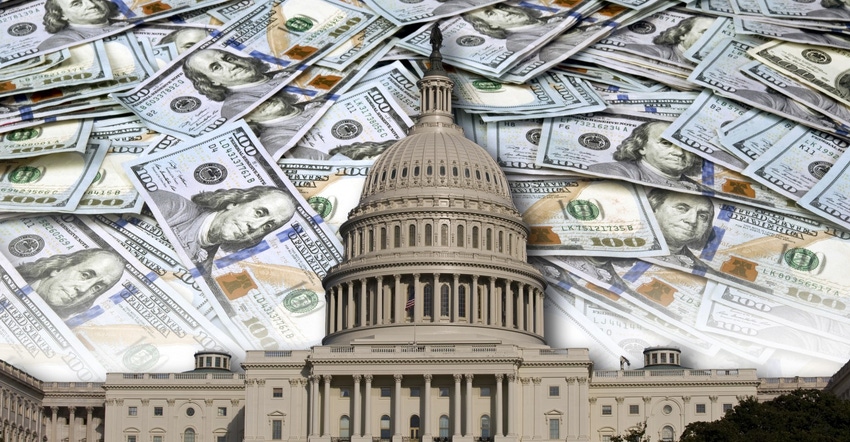
Infrastructure funding has normally found bipartisan support, but that has eluded Congress in recent years over partisan bickering. The question now turns to whether Congressional members in the House will take a win and advance the Senate’s bipartisan $1 trillion deal brokered with President Biden, or whether the future rests in also passing the $3.5 trillion budget reconciliation that doesn’t require any Republican member votes.
The bipartisan infrastructure package focuses on physical infrastructure and would inject $550 billion in new funding to repair roads, bridges and waterways, as well as $65 billion more for increasing access to broadband internet. The total cost of the bill comes to nearly $1.2 trillion when traditional programs are reauthorized.
In a notice from Michael Best Strategies’ Federal Policy Team, they explain there is an inter-chamber battle on how to proceed on the infrastructure package. The House already passed its own version, which the Senate replaced with the bipartisan bill brokered with the President.
House Transportation and Infrastructure Chairman Peter DeFazio, D-Ore., who spent months on his own plan, is “furious,” they say. “House progressives, similarly, feel the bipartisan package includes too many provisions favorable to the fossil fuel industry and too few targeted to the neediest communities.”
With the ball back in the House’s court, there are essentially three basic scenarios the House can pursue, they lay out. “First, it could simply pass the Senate bill without making any changes, which would send it straight to President Biden’s desk for signature. This seems unlikely, given how many House Democrats are unhappy with the Senate plan, only three or four members could withdraw their support and hobble the bill’s progress.
“Second, the House could amend the Senate bill, which would send it back to the Senate for further consideration. Finally, the whole effort could collapse under its own weight amid squabbles within the House and/or between the House and Senate,” they add.
“Moderate Democrats, typically from red-leaning districts and facing a tough 2022 midterm election, want to pass the Senate’s bipartisan infrastructure bill as-is right away,” the notice states. “Progressives, however, wants to delay a vote until the Senate also sends over its $3.5 trillion filibuster-proof families and climate package due in mid-September.”
Reconciliation framework
The budget resolution, including instructions on how to draft the spending package, passed by Senate Democrats on a party-line vote of 50 to 49. It sets the stage for the $3.5 trillion reconciliation package without Republican support that would focus on many of the provisions in Biden’s American Families Plan, including provisions for healthcare, climate and education.
Senate committees with jurisdiction over each issue will take the lead in turning the Senate’s summary into workable legislative language. For agriculture, the budget resolution includes $135 billion in spending for measures including: conservation, drought, and forestry programs to help reduce carbon emissions and prevent wildfires; rural development and rural co-op clean energy investments; agricultural climate research and research infrastructure; Civilian Climate Corps funding; child nutrition; and debt relief.
During debate on the framework, the U.S. Senate agreed to preserve the critical step-up in basis tax treatment of farms and ranches as part its $3.5 trillion dollar budget blueprint. The amendment, offered by Sen. John Thune, R-S.D., called for preserving current tax rules for transferring farms and businesses, including maintaining the current rules around stepped-up basis. It was adopted on a 99-0 vote. While the Thune amendment is non-binding, this is a positive sign moving into Senate crafting of the $3.5 trillion reconciliation package, the American Soybean Association noted in a notice to farmer members.
Sen. Joni Ernst, R-Iowa, successfully added her amendment—with bipartisan support—to block Congress from imposing a costly new “Cow Tax” on farmers and ranchers. Ernst took to the Senate floor to bar any new permits or federal methane requirements on livestock that could increase the cost of beef or other critical products.
Once the Senate committees deliver their portions of a reconciliation proposal in mid-September, the Senate Budget Committee will stitch them together into a single package for Senate floor consideration. The House is expected to return to Washington on the week of August 23 to potentially kick off their own parallel reconciliation process with their committees writing legislative language.
Then reconciliation's procedural rules may trim the plan even more, similar to how the $15 minimum wage provision was pulled from the reconciliation package Democrats advanced earlier this year.
Democrats promise to create in reconciliation a path to U.S. citizenship for select immigrants, including farmworkers. “The budget process is an awkward (if not unlawful) way to pass immigration reform, but President Biden and Democrats in Congress have rallied around the idea after bipartisan negotiations on the matter have stalled for decades,” explains the notice from Michael Best Strategies.
If the Senate Parliamentarian finds any provisions that violate the Byrd Rule designed to keep non-budget priorities out of reconciliation packages, she can unilaterally strike them from the bill.
The Senate is divided 50-50, meaning all Democrats plus tiebreaker Vice President Kamala Harris must hold together to advance a reconciliation plan. House Democrats also have little room for error, controlling their chamber by just three votes.
Following the votes, Biden was asked whether he was confident that he has all the support of all the Democrats to advance the $3.5 trillion package.
“I think, over the next month, which is the way it's going to work, they vote on all of these amendments, and then they get to the business of seeing how they can make it work,” Biden said, who earlier also called himself a congenital optimist. “I think we will get enough Democrats to vote for it, and I think that the House will eventually put two bills on my desk: one on infrastructure, and one on reconciliation.”
Read more about:
InfrastructureAbout the Author(s)
You May Also Like






